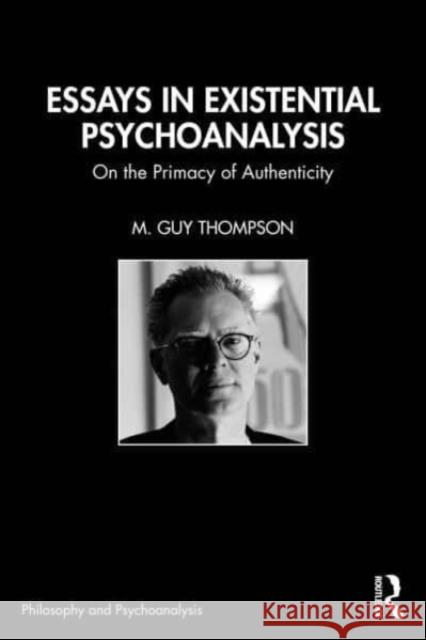Essays in Existential Psychoanalysis » książka



Essays in Existential Psychoanalysis
ISBN-13: 9781032551234 / Angielski / Miękka / 2023 / 304 str.
Essays in Existential Psychoanalysis
ISBN-13: 9781032551234 / Angielski / Miękka / 2023 / 304 str.
(netto: 158,55 VAT: 5%)
Najniższa cena z 30 dni: 151,07
ok. 22 dni roboczych.
Darmowa dostawa!
In this brilliant and revolutionary collection of fourteen major essays that draw from more than twenty-five years of painstaking research, M. Guy Thompson regales us with a stunning revisioning of conventional psychoanalysis that deepens our understanding of the human condition.
'Essays in Existential Psychoanalysis: On the Primacy of Authenticity draws together 14 major papers written by Michael Guy Thompson. Their aim is to reconsider various foundational themes and assumptions within psychoanalysis from the focus point of existential theory. Always exciting to read, they are uniformly and clearly argued and presented. Thompson is rightfully renowned as an original theorist whose writing is both accessible and challenging, as well as to the point and passionate. These essays are intended to provoke and illuminate. Not only do they achieve this aim, in my view they surpass it thanks to the author's mastery of the material under discussion and, not least, his genuine enthusiasm in offering fresh perspectives on both psychoanalysis and existentialism.'
Professor Ernesto Spinelli, PhD, author of Practising Existential Therapy: The Relational World
'A unqiue and absorbing development of key commonalities between existential and psychoanalytic apporaches to understanding clinical issues and the human condition. This book is a unique integration of existential philosophy and psychoanalysis, comprising Dr Thompson's nearly thirty years of painstaking publications that have developed this perspective. As an existential psychoanalyst, Thompson explores concepts such as experience, authenticity, will, and agency by utilizing a wide range of thinkers from the ancient Greeks through to Nietzche, Freud, Heidegger, Sartre, and Laing. His thought-provoking existential perspective on psychoanalytic concepts such as free association, neutrality and working through makes this an invaluable and distinctive contribution to existential psychoanalysis.'
Douglas Kirsner, PhD, Emeritus Professor, Deakin University, Melbourne, Australia; author of The Schizoid World of Jean-Paul Satre and R.D. Laing and Unfree Associations: Inside Psychoanalytic Institutes
'M. Guy Thompson knew and worked with some of the greats from the 20th century. Among these were R.D. Laing and Ernest Hemingway no less! And their influence is palpable. In this volume, Thompson's excursion through the interiors of existential psychoanalysis is exquisitely lucid and engaging—a revelation even to those of us schooled in its principles. Any reader wishing to understand the basis and importance of existential analysis in contemporary theory and practice simply must read this volume. With both passion and intimate experience, Thompson shows precisely why existential analysis still informs the bedrock of depth psychotherapy.'
Kirk. J. Schneider, PhD, author of Life-Enhancing Anxiety: Key to a Sane World, The Psychology of Existence (with Rollo May), and Existential-Integrative Psychotherapy
'A fascinating, enlightening and stimulating exploration of the interface and intertwining of existential and psychoanalytic thinking. This book is strong in both its detailed analysis and overall vision and co-nourishing vistas of existential-psychoanalytic theory and practice, in support of our appreciative sense of lived experience.
Michael Eigen, PhD, author of Contact with the Depths, The Sensitive Self, The Psychoanalytic Mystic, and Flames from the Unconscious
'The beauty of Thompson's approach, which he exemplifies throughout his book, lies in an emotional sensibility rather than just a theoretical doctrine. This rich text brings the existential sensibility to life in a manner that will be highly valuable to psychoanalytic therapists of all persusasions, as well as those who officially advocate existentialist thought.'
Robert D. Stolorow, PhD, author of Trauma and Human Existence and The Power of Phenomenology: Psychoanalytic and Philosophical Perspectives
'I know I am not alone in considering Michael Guy Thompson to be perhaps the best living exponent of existential psychoanalysis. Michael uniquely develops for us in the 21st century an unprecedented and compelling integration of continental philosophy and psychoanalysis. We are very fortunate to have so many of Thompson's key writings in one volume.'
Professor Del Loewenthal, University of Roehampton and Southern Association for Psychotherapy and Counselling (SAFPAC), UK, author of Existential Psychotherapy and Counselling After Postmodernism
Acknowledgements Preface: What Is the Existentialist Sensibility? 1. Sartre and Psychoanalysis: The Role of Freedom in the Clinical Encounter 2. Nietzsche and Psychoanalysis: The Fate of Authenticity in a Postmodernist World 3. Logos and Psychoanalysis: The Role of Truth and Creativity in Heidegger's Conception of Language 4. What Is the Will? On the Role of Desire in Psychoanalysis 5. Vicissitudes of Authenticity in the Psychoanalytic Situation 6. The Crisis of Experience in Contemporary Psychoanalysis 7. The Sceptic Dimension to Psychoanalysis 8. Happiness and Chance 9. Is the Unconscious Really all that Unconscious? 10. The Demise of the Person in the Psychoanalytic Situation 11. Deception, Mystification, Trauma: Laing and Freud 12. Free Association: A Technical Principle or Model for Psychoanalytic Education? 13. The Rule of Neutrality 14. The Existential Dimension to Working Through Index
M. Guy Thompson, PhD, is Founder and Director of the New School for Existential Psychoanalysis and a Personal and Supervising Analyst and Faculty Member at the Psychoanalytic Institute of Northern California, San Francisco. His two most recent books, The Legacy of R. D. Laing (2015, editor) and The Death of Desire (2017, 2nd ed.), are also published by Routledge. Dr. Thompson is the author of numerous books and journal articles on psychoanalysis, phenomenology, and psychosis. He lives in Berkeley, California.
1997-2026 DolnySlask.com Agencja Internetowa
KrainaKsiazek.PL - Księgarnia Internetowa









